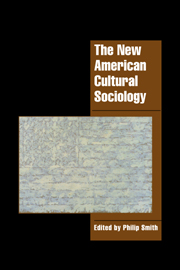The new American cultural sociology: an introduction
Published online by Cambridge University Press: 18 January 2010
Summary
Over the past ten to fifteen years “culture” has developed to become one of the most popular and important areas within sociology in the United States. This increasing awareness attests to both the scope and the quality of contemporary cultural work. As this new wave of discourse matures, and as its practitioners and ideas become more central to the discipline, the need grows for an overview of the area. This collection of papers is intended to provide such a guide. The contributions to this book illustrate the variety of work that is now being done by American cultural sociologists. But they also do more than this. Sometimes the whole can be greater than the sum of its disparate parts, and in combination the work presented here suggests and documents a distinctive, new, American tradition in cultural sociology. The aim of this introductory essay is to indicate the genesis and form of this tradition. The first section positions contemporary American cultural sociology in an historical context, via an exploration of the shifting theoretical tides of the discipline. The second part documents the cluster of family resemblances which constitute the discursive field, drawing contrasts with other modes of socio-cultural inquiry. I turn first to the issue of genesis.
The new-found appreciation of culture in American sociology can be explained in terms of a pendulum effect linking intellectual cohorts with theoretical positions. This has seen culture swing back into the analytic spotlight from a dark exile at the margins of the profession. During the late 1960s and the 1970s there was a massive reaction against cultural explanation in American sociology. Culture was tainted by its association with Parsonian normative functionalism.
- Type
- Chapter
- Information
- The New American Cultural Sociology , pp. 1 - 14Publisher: Cambridge University PressPrint publication year: 1998
- 8
- Cited by

